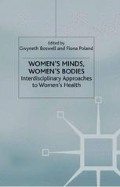Abstract
Women are frequent users of health services, not only for themselves, but also for those for whom they care — children, dependent adults and older people. Their ability to access good and appropriate health care, both in their own right and as caregivers is, therefore, of paramount importance (Pavalko, 2000). Some women are more skilled and able to access appropriate care. For example, individuals in higher socio-economic groups do better than those in lower socio-economic groups in accessing health care (Townsend and Davidson, 1988), and in their survival of cancer and heart disease (Phipps, 1999). Reasons for inequalities are many, ranging from communication skills through to affordability (Northam, 1996). Many studies of take-up of health care such as immunization, screening and health clinics, conclude that poor and less well-educated people are less likely to take up services, or to use them appropriately. This is a situation which is both costly and may contribute to some diseases re-establishing themselves in vulnerable and socially excluded groups without early interventions. There are indications of a continuing and ‘growing division between the haves and have nots in our society’ (Millman, 1993: p. 4).
Access this chapter
Tax calculation will be finalised at checkout
Purchases are for personal use only
Preview
Unable to display preview. Download preview PDF.
Further reading
Hall, P., Ward, E., ‘Cervical screening for women with learning disability: Numbers screened can be optimised by using a focussed initiative’, British Medical Journal, 318 (1999) 536–37.
Nightingale, C, ‘Barriers to health access; a study of cervical screening for women with learning disabilities’, Clinical Psychology Forum, 137 (March 2000) 26–30.
Pavalko, E.K. and Woodbury, S., ‘Social roles as process: caregiving careers and women’s health’, Journal of Health and Social Behaviour, 41 (1) (2000) 91–105.
Salganicoff, A. and Wyn, R. ‘Access to care for low-income women: the impact of Medicaid’, Journal of Health Care for the Poor and Underserved, 10 (4) (1999) 453–67.
Editor information
Editors and Affiliations
Copyright information
© 2003 Palgrave Macmillan, a division of Macmillan Publishers Limited
About this chapter
Cite this chapter
Nightingale, C. (2003). Can Women with Learning Disabilities Access Good Health Care? A Case Study of Cervical Screening. In: Boswell, G., Poland, F. (eds) Women’s Minds, Women’s Bodies. Palgrave Macmillan, London. https://doi.org/10.1057/9781403919885_12
Download citation
DOI: https://doi.org/10.1057/9781403919885_12
Publisher Name: Palgrave Macmillan, London
Print ISBN: 978-1-349-42413-9
Online ISBN: 978-1-4039-1988-5
eBook Packages: Palgrave Social & Cultural Studies CollectionSocial Sciences (R0)

